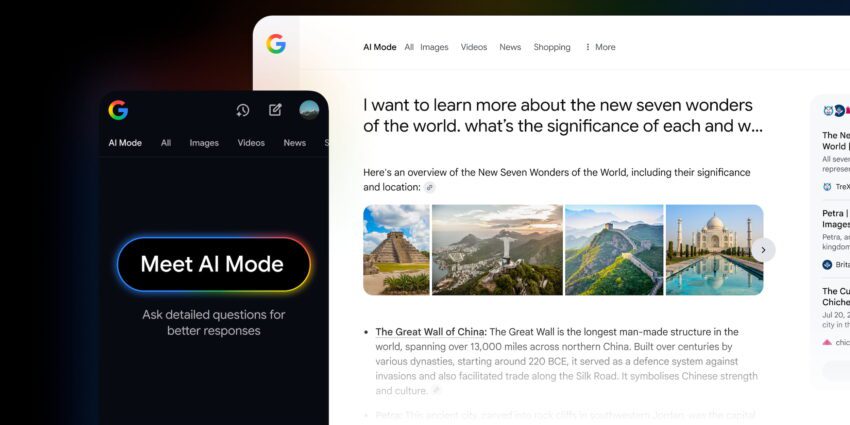
google ai mode expanding to 180 countries, getting agentic restaurant finder, more: Google ai mode expanding to 180 countries — Google is significantly expanding its AI Mode, which will now be available in 180 countries, introducing advanced features including an agentic restaurant finder for AI Ultra subscribers..
Google Ai Mode Expanding To 180 Countries
Google is significantly expanding its AI Mode, which will now be available in 180 countries, introducing advanced features including an agentic restaurant finder for AI Ultra subscribers.
Expansion of Google AI Mode
Initially launched in just three countries, Google has announced a major expansion of its AI Mode to a total of 180 countries. This strategic move reflects the tech giant’s commitment to enhancing user experience through artificial intelligence. The expansion aims to provide a broader audience with access to innovative features that can simplify everyday tasks.
Initial Launch and Features
The first rollout of Google AI Mode took place in select countries, where it allowed users to leverage AI for various functionalities, such as personalized recommendations and streamlined search capabilities. The initial launch was met with a positive response, prompting Google to consider a wider release. With the latest update, the AI Mode will now be accessible to millions of users globally.
Agentic Capabilities for AI Ultra Subscribers
One of the most notable features included in the expansion is the introduction of agentic capabilities for AI Ultra subscribers. This new functionality allows users to interact with the AI in a more dynamic manner, enabling it to perform tasks on their behalf. Among the first applications of this capability is a restaurant finder that can suggest dining options based on user preferences, location, and even current trends.
Understanding Agentic Features
The term “agentic” refers to the ability of the AI to act autonomously and make decisions based on user input and contextual information. This represents a shift from traditional AI models that primarily respond to user queries. The agentic restaurant finder exemplifies this shift, as it not only provides recommendations but also considers factors such as dietary restrictions, user reviews, and real-time availability.
How the Agentic Restaurant Finder Works
The restaurant finder operates by analyzing various data points to curate a list of dining options tailored to individual users. Key features include:
- Personalized Recommendations: The AI learns from user interactions, preferences, and past choices to refine its suggestions.
- Real-Time Data: It uses live data to provide updated information about restaurant hours, availability, and wait times.
- Integration with Maps: The finder seamlessly integrates with Google Maps, offering navigation and directions to chosen dining locations.
- User Feedback: Users can provide feedback on recommendations, which the AI uses to improve future suggestions.
Implications of the Expansion
The expansion of Google AI Mode to 180 countries is significant for several reasons. Firstly, it democratizes access to advanced AI technology, allowing users in diverse regions to benefit from enhanced functionalities. This move could potentially reshape how people interact with technology in their daily lives.
Global Reach and Accessibility
By making AI Mode available in more countries, Google is addressing the varying needs of users across different cultures and regions. This global approach not only enhances user experience but also positions Google as a leader in the AI space. The ability to cater to a wider audience can lead to increased user engagement and loyalty.
AI Ultra Subscription Model
The introduction of agentic features is part of Google’s broader strategy to promote its AI Ultra subscription model. This model offers users exclusive access to advanced features and capabilities that are not available in the standard version of AI Mode. By incentivizing users to subscribe, Google aims to generate additional revenue while providing enhanced value to its customers.
Potential Challenges Ahead
While the expansion presents numerous opportunities, it also comes with challenges. As Google rolls out AI Mode to more countries, it must navigate various regulatory environments and cultural sensitivities. Different countries have distinct privacy laws and regulations concerning data usage, which could impact the functionality of the AI.
Addressing Privacy Concerns
Privacy is a critical concern in the AI landscape. As Google gathers data to enhance its AI capabilities, it must ensure that user privacy is protected. This involves transparent data collection practices and robust security measures to prevent unauthorized access. Compliance with local laws will be essential to maintain user trust and avoid potential legal issues.
Competition in the AI Space
Google’s expansion of AI Mode also places it in direct competition with other tech giants in the AI field. Companies like Microsoft and Apple are also investing heavily in AI technologies. As competition intensifies, Google will need to continuously innovate to maintain its edge in the market.
Conclusion
The expansion of Google AI Mode to 180 countries marks a significant milestone in the company’s efforts to enhance user experience through artificial intelligence. With the introduction of agentic capabilities, particularly the restaurant finder, Google is setting a new standard for how AI can assist users in their daily lives. As the company navigates the challenges of privacy and competition, its commitment to innovation will be crucial in shaping the future of AI technology.
Source: Original reporting
Further reading: related insights.
Was this helpful?
Last Modified: August 27, 2025 at 1:51 am
2 views















